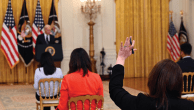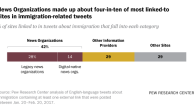Overview

Most Americans continue to say they are hearing a mix of good and bad news about the nation’s economy, though the percentage hearing mostly bad news has ticked up since last month.
Nearly six-in-ten (57%) say they are hearing mixed news about the economy, 30% say they are hearing mostly bad economic news and 11% say they are hearing mostly good news, according to the latest weekly News Interest Index survey, conducted April 5-8 among 1,000 adults by the Pew Research Center for the People & the Press. The survey was in the field when a new federal jobs report was released April 6 that showed worse than expected job growth in March but a slight dip in the unemployment rate to 8.2%.
In early March, 62% said they were hearing mixed news about the economy, while 24% said they were hearing mostly bad economic news. Just as in the latest survey, 11% said they were hearing mostly good news.
Public perceptions of the tone of economic news are not much different than they were one year ago. Now, though, the number hearing mostly good news – while still small – is double what it was last April (11% vs. 5%). Views of economic news turned much more negative last August, amid fears that the economy could be slipping back into recession. At that point, 67% said they were hearing mostly bad news about the economy
Majorities of each partisan group say they are hearing a mix of good and bad economic news, but Democrats are much more

likely than Republicans or independents to say they are hearing mostly good news. Democrats are about equally likely to say they are hearing mostly good or mostly bad news (20% vs. 19% respectively). The balance is much more negative for Republicans and independents. Among the GOP, 40% say they are hearing mostly bad news, while just 5% are hearing mostly good news. Among independents, 33% say they are hearing mostly bad news; 6% say they are hearing mostly good news.
Trayvon Martin Case Remains Top Story

For the third straight week, the controversy over the shooting death of Trayvon Martin was the public’s top story, though coverage dropped considerably. A third of the public (33%) say they followed news about the death of the African American teenager in Florida more closely than any other news, about twice the percentage citing the economy (16%) or the 2012 elections (15%). News about the controversy made up 7% of coverage, down from 18% one week earlier, according to a separate analysis by the Pew Research Center’s Project for Excellence in Journalism (PEJ).
African Americans continue to follow news about the controversy more closely than whites. About seven-in-ten blacks (72%) say they followed Trayvon Martin developments more closely than any other story, compared with 26% of whites. Looking at partisans, 45% of Democrats say this was their top story last week, three times the 15% of Republicans that say this. Among independents more than a third (36%) say this was their top story.
Looking at a separate measure, 67% of African Americans say they followed news about developments in the Trayvon Martin case very closely, while 29% of whites say this. Those numbers are only slightly changed from one week earlier. Overall, 34% say they followed news about the controversy very closely.
Nearly four-in-ten (37%) say they followed news about the economy very closely, a level of interest similar to most weeks in recent months. News about the economy made up 7% of coverage, excluding coverage of the debate in Washington over the federal budget.

About three-in-ten (31%) say they very closely followed news about the candidates for president in 2012. Republicans are more likely to say they followed this news very closely (43%) than are Democrats (32%) or independents (26%). With several primaries last week, election news topped coverage, accounting for 22% of the newshole.
A quarter (25%) say they very closely followed news about the ongoing debate in Washington over the federal budget; just 3% say this was the news they followed most closely. News about the federal budget debate made up 1% of coverage.
About two-in-ten (21%) say they very closely followed news about the shooting rampage at a small college in Oakland, Calif., that left seven dead; 5% say this was their top story of the week. News about the shootings at Oikos University made up 2% of coverage.
Just 15% say they very closely followed news about international efforts to stop the political violence in Syria; 2% say this was the news they followed most closely. News about Syria accounted for 3% of coverage.
These findings are based on the most recent installment of the weekly News Interest Index, an ongoing project of the Pew Research Center for the People & the Press. The index, building on the Center’s longstanding research into public attentiveness to major news stories, examines news interest as it relates to the news media’s coverage. The weekly survey is conducted in conjunction with The Project for Excellence in Journalism’s News Coverage Index, which monitors the news reported by major newspaper, television, radio and online news outlets on an ongoing basis. In the most recent week, data relating to news coverage were collected April 2-8, and survey data measuring public interest in the top news stories of the week were collected April 5-8, 2012, from a nationally representative sample of 1,000 adults.




